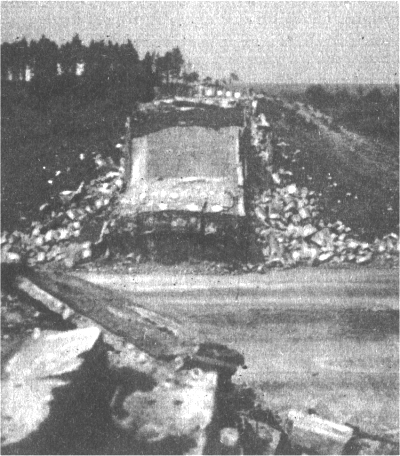|
|
|
Although the war did not officially and [end] until the 9th of the month, May began with the Battalion in transition from a combat unit to an occupational force. Many different and difficult problems immediately sprang up: bullets ceased to be a danger but countless Germans in uniform, and refugees, all running from something, lent a harrassing strain to the troops. The unoccupied area to the East of our Battalion postions with its free cities of Geringswald, Hartha, Waldheim and Mittweida, overflowed with fleeing misses [masses] seeking haven within our lines along the Mulda River. From the military aspect, the first few days of May were devoted to knocking out the last props keeping the tottering German fighting machine from cataclysmic defeat. When the final strangle hold, the linking with the Russians was imminent, negotiations for complete surrender of the German Middle Army Group were entered into between Colonel Ward and the German General Hiedenkamp, who represented Field Marshall Schoerner, Commander of the Middle Army Group. Activity was confined to containing the lines along the Mulda River, conducting patrols to the East, and guarding the bridges and roads into Rochlitz.
|
|
ALONG THE AUTOBAHN 
In en effort to delay the Armored Columns speeding up the Super Duper (Hitler's Military Highway) the Jerries blew many bridges that'd be scarcely used anyway. At least not while the smooth, paved two lane Autobahn was handy. |
|
Our Battalion was complete while we held the bridgehead over the Mulda Rivet on the first day of the month. "C" Company of the 44th, working in conjunction with our Battalion, maintained contact patrols to the North and South and also helped in blocking the roads into Rochlitz. Negotiations were begun with the chief medical official of the remaining German territory; he wished to surrender his staff, his hospitals and approximately 2000 soldiers patients. The parley was continued on the 2nd when it was agreed the hospitals were to be moved to Geringswald. A lead was also obtained on that day which began the talks for the surrender of the remaining enemy fighting troops. Lt. Col. Ward and Major Root, with Cpl. Bernhard as interpreter, went to Hartha to meet a representative of the enemy Commander. No change came within the next three days. A cub plane of the 128th Field Artillery Battalion accompanied all patrols as air observer but, even with this additional aid, nothing of a disturbing nature was encountered. National colors were also carried, as contact with the Russians was imminent. Negotiations continued favorably; Each day the number of enemy soldiers involved in the proposed capitualation increased, until on May 6 it became apparent that the Field Marshall of the entire Middle Army Group was being represented. Late that afternoon General Heidenkamper met with Brigadier General George W. Read in our Battalion Command Post, but no definite agreement could be reached since General Read would consider nothing short of unconditional surrender. After Waldheim and Mittweida had been declared open, "B" Company sent a platoon into the former town and "C" Company had a platoon in the latter town. Geringswald had previously been declared a hospital city to handle the surrendered military hospitals, but it soon became necessary to do the same for Hartha to handle the overflow of patients. The Super Sixth made its first contact with the Russian Army at 2220 on May 6, 1945, when "B" Company of our Battalion reported an eight man Russian patrol had entered Waldheim, however it was not unitl May 7th that the Battalion staff made the first personal contact with a Russian Captain.
After physical contact was made with the Russians no further patrols were sent out, but Gemans straggled in all day to our out posts. The 8th of May was spent in waiting for official announcement of the war's end and in hadling the ever growing hordes of displaced persons. |
![Major General Crow [Grow] pins silver star](50_aib_history_16_pg60_grow.jpg)
Major General Robert W. Crow [Grow], pine Silver Star on Ist [1st] Sergeant Victor Winenwerder, in a gigantic Battalion Formation at Eisenberg, Germany. |
|
Midnight brought final word of peace in Europe amidst a puny, half hearted celebration by the troops. The cessation of hostilities brought no immediate change in military activities; the bridgeheads were still held while prisoners and displaced persons continued to be a major problem.
It was not until nearly mid-May that our troops were withdrawn from the two free cities, except for one squad from "B" Company, left behind to occupy the west end of Geringswald. The Battalion then assumed complete control over every road and bridge leading into the city of Rochlitz, confining its activities to preserving law and order, as well as assisting in the evacuation of former slave laborers. When the 76th Infantry Division moved into the area on May 13, our mission had been completed, at which time the Battalion moved to the City of Eisenberg, there to await whatever the future held in store; a future that would be determined by the demands of a free people whose untold sacrifices gave proof of a determination to live in harmony in a family of peacful nations. Under provisions of Section 1, Circular No. 345, War Department, dated 29 August 1944, SERVICE COMPANY, 50th Armored Infantry Battalion is awarded the STAR, in addition to the Meritorious Service Unit Plaque, previously awarded. These awards are in recognition of the superior performance of duty, and outstanding devation [devotion] to duty, in the performance of eceptionally difficult tasks. Also the award further recognizes the the achievement and maintenance of a high standard of disipline. |